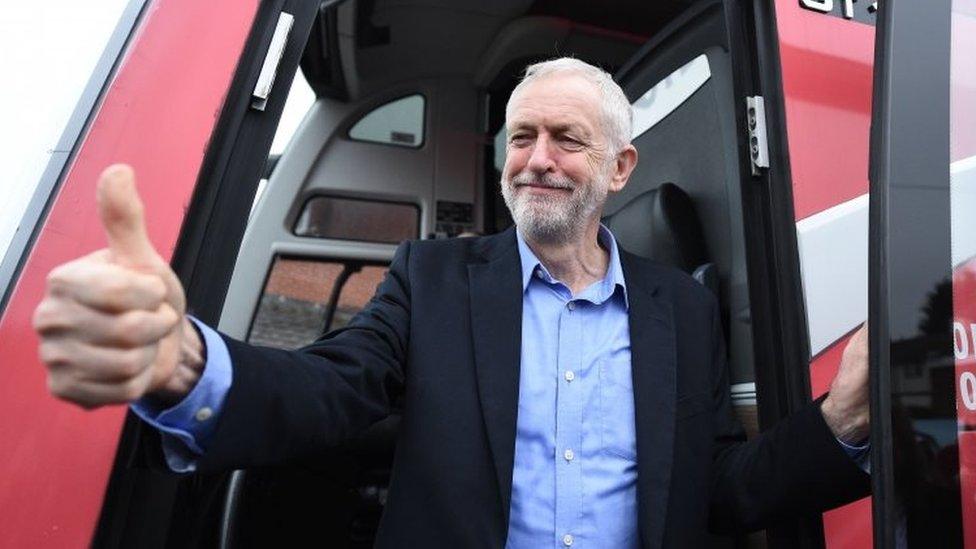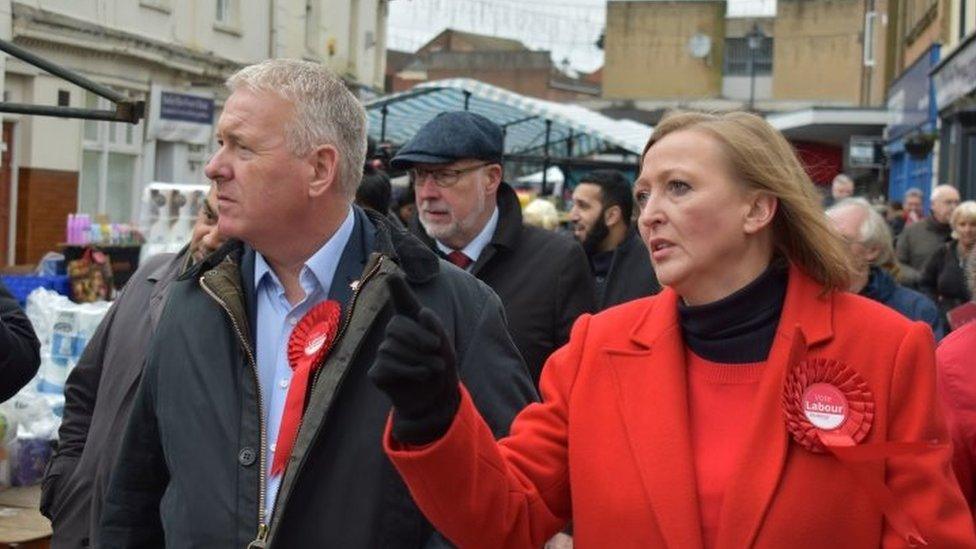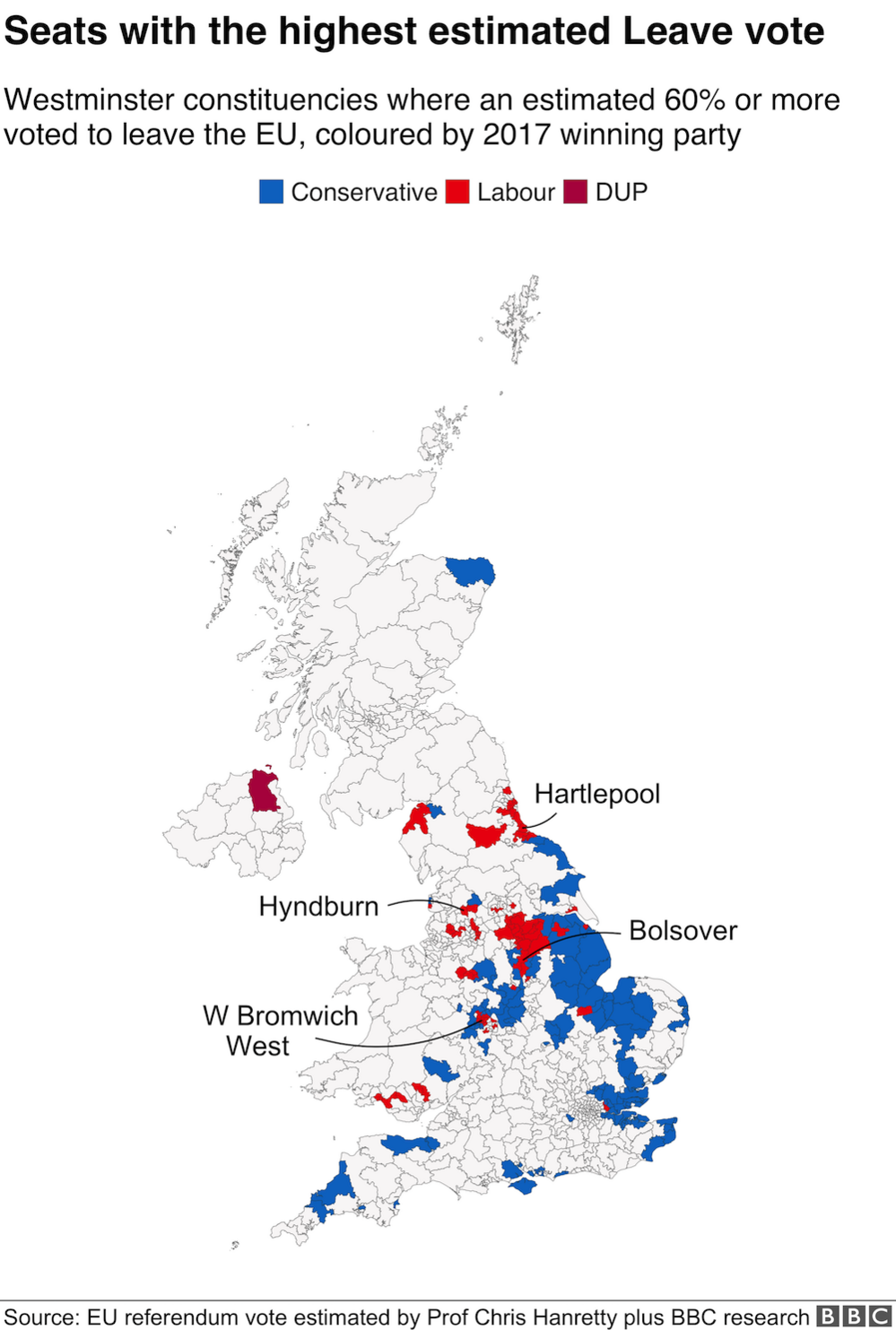General election 2019: Labour to change strategy with two weeks to go
- Published
- comments

The Labour Party is to re-shape its general election campaign strategy - particularly in Leave-voting areas - to try to turn around a stubborn Conservative opinion poll lead.
Insiders told the BBC that in the first half of the election campaign, a key error was that the Liberal Democrat threat had been overestimated, while the willingness of Leave voters to switch from Labour to the Conservatives had been underestimated.
In the last two weeks of the campaign, this will change.
Labour's strategy so far has been - in part - to emphasise that the election is about more than Brexit and to get voters to focus on issues which would unite Labour voters in Leave and Remain areas.
Labour's own polling suggests this has been a partial success - but there is a crucial flaw.
Home territory?
In some Leave-supporting areas, the defining issues for voters have become the NHS and the cost of living, with Brexit further down the list of priorities.
That should be good news for Labour - safer, "home" territory.
But, despite this, the party is still seeing its vote drain away in the very places that it needs to retain to deprive Boris Johnson of an overall majority.
So a new plan has been hatched and is about to be put in to effect.
It is designed to appeal to those who voted for Brexit, and to those who have other concerns but just don't think Labour is on their side.
In the next two weeks, if you live in a Leave area, you are likely to see a very different style of campaign.
Activists on the move
Labour will give a higher profile to shadow cabinet members who back a Leave deal rather than Remain.
There will also be a tour of Leave areas by the party chairman Ian Lavery, who ideally would rather leave the EU with a deal than remain.
The "honest broker" himself - Jeremy Corbyn - will be touring some Leave seats very soon too.
And more activists are set to be moved to Leave areas.
The message will be that Labour's Leave deal would offer voters a genuine choice - and that a new referendum will not be an attempt to remain in the EU by the back door.
There will be an attempt to explain the deal Labour is seeking to negotiate - and that it would protect workers' rights.
In other words, the party leadership is not opposing Brexit by opposing Boris Johnson's deal - it simply wants to find what it regards as a better one.
That may be a tricky argument, compared with the simplicity of the Conservative message of getting Brexit "done".
But it is felt that reassurance for Leave voters is necessary.
There will also be an attempt to challenge the Conservative narrative that a trade deal with the EU can be done in a year.

Ian Lavery on a walkabout with Labour's Walsall North candidate
And there will be new initiatives around US President Donald Trump's visit to the UK next week, designed to highlight concerns around any post-Brexit trade deal with the US.
Beyond Brexit, there will be a new emphasis on "bread-and-butter issues", which some strategists think have been underplayed to the party's political cost, from extending free bus fares to boosting police numbers.
Labour's nationalisation programme will be sold, in part, as taking back control of key businesses from foreign ownership.
And in both Leave and Remain areas, there will be a stronger push on the NHS and a new emphasis on how Labour would make most people better off.
The party's line that 95% of people will not pay more in tax is under pressure.

What do the polls say?
The new strategy has been prompted by Labour's own polling, and was devised before the release of a YouGov poll on Wednesday. This new poll suggested the Conservatives would get a 68-seat majority, if the election was held tomorrow.
The YouGov poll, based on the views of 100,000 voters, applies national trends to individual constituencies - and predicts the Tories will pick up 44 seats from Labour, including in its traditional strongholds in the Midlands and North of England.
But it comes with a big margin of error and does not reflect local issues that can have an impact on polling day.
Another poll, by Savanta ComRes for the Daily Telegraph, suggests Labour is narrowing the gap on the Conservatives, with the Tories on 41%, down one point from the weekend, and Labour up two points at 34%, at the expense of the Liberal Democrats, who are on 13%.

What the map shows

The Conservatives are hoping to capture longstanding Labour constituencies that voted heavily to Leave - even those outside the normal marginal range.
The map shows that these are concentrated in the Midlands and parts of the north of England - seats like West Bromwich West, external, Bolsover, external, and Hyndburn, external.
However, the Brexit Party has a similar goal. It describes Hartlepool, external as its number-one target.

Corbyn's leadership
Given Labour's change in strategy, expect to see it made easier for people to "calculate" how they' would be better off as a result of a suite of policies, depending on their income and lifestyle, from a rise in National Living Wage, and a public sector pay increase to free childcare and, of course, compensation for women caught out by a rise in the pension age.
During the first half of the campaign, it was felt in Labour circles that many individual policy announcements just were not joined-up or launched with sufficient impact.
Canvassers - again, particularly in Leave areas - have been reporting that Mr Corbyn's leadership has come up time and again on the doorstep.
But rather than hide him away, expect the party leader to be more prominent.
The hope is that familiarity - and a different style to the prime minister - will breed the opposite of contempt.
Labour was also behind at this stage in the 2017 campaign, then finally ran Theresa May close.
But it is a greater challenge to keep a volatile coalition of Leave and Remain voters together just a matter of weeks before the current government intends to take the UK out of the EU - and when attitudes on both sides of the Brexit debate seem to be hardening.
A senior Labour source who is sceptical of this approach said: "The truth is the problem on the doorsteps I have been to - and this is reflected when you speak to our candidates - isn't Brexit.
"It's the leadership. This so-called change in strategy feels like an attempt to deflect from that elephant in the room."
What more have senior Labour figures said?
When asked the party's change of campaigning emphasis, shadow international trade secretary Barry Gardiner told BBC Radio 4's Today programme: "This is news to me...I have not had any discussions on that."
He added: "Obviously what we want to do is to make sure that we keep on, as we have been doing over the past few weeks, narrowing that margin in the polls."

CONFUSED? Our simple election guide, external
POLICY GUIDE: Who should I vote for?, external


Between now and the election on 12 December, we want to help you understand the issues behind the headlines.
Keep up to date with the big questions in our newsletter, Outside The Box.
Sign up to our Outside The Box here (UK users only).